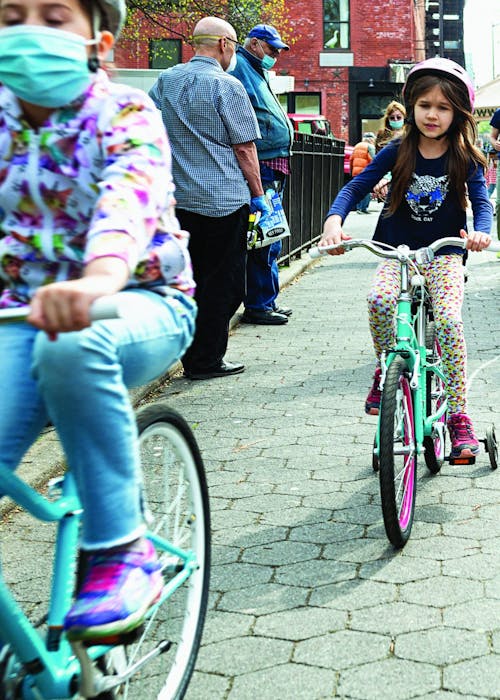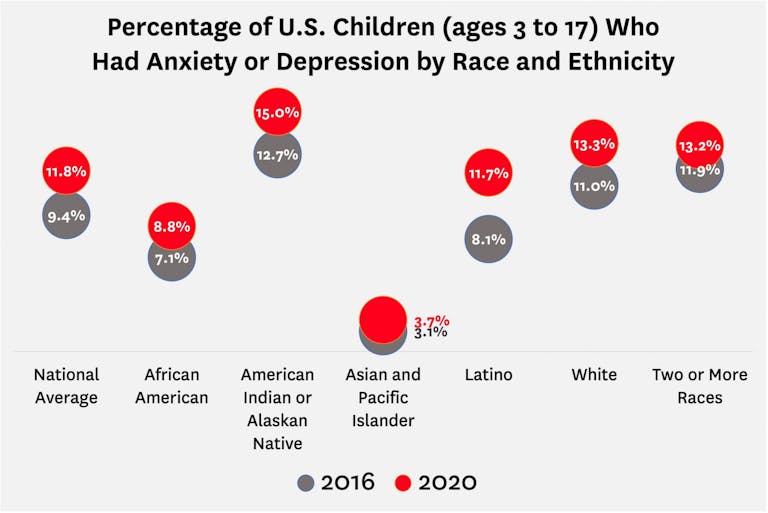

A More Equitable Future Demands Data
Insights
September 30, 2022
By: Bijan Kimiagar
CCC Participates in the 2022 Community Indicators Consortium Summit
The Community Indicators Consortium (CIC) hosts an annual summit in support of communities’ efforts to use data to improve quality of life. At this year’s summit, A Brighter Future for Communities and Community Indicators, Citizens’ Committee for Children of New York (CCC) participated as part of an invited panel and interactive workshop.
Highlighting Children’s Behavioral Health Needs During the Pandemic
Recognizing that behavioral health has been a priority for advocates nationally and in New York prior to the pandemic and more so during the pandemic, presentations during the invited panel included a focus on children’s behavioral health needs. For example, the 2020 National Survey of Children’s Health reported nearly 1 in 6 children ages 3 to 17 had anxiety or depression, and this issue is most prominent for children of color.

Source: Child Trends’ analysis of the U.S. Department of Health and Human Services’ 2016 and 2020 NSCH, as reported in the 2022 KIDS COUNT data book.
CCC’s presentation on the 2022 edition of Keeping Track of NYC’s Children also addressed the issue of behavioral health needs specifically for New York City children. Although data on children’s behavioral health in general is lacking, the Keeping Track data book reports on data from sources that do exist, including the Centers for Disease Control’s Youth Risk Behavior Survey, the Census Bureau’s Household Pulse Survey, and New York State Office of Mental Health’s Patient Characteristic Survey.
During the panel, we also guided participants to advocacy resources in support of children’s behavioral health, such as the Healthy Minds, Healthy Kids campaign. CCC is a co-convener of the campaign, which seeks to create the public and political will needed to ensure that all children and adolescents in New York receive the high-quality behavioral health services they need, including those they are legally entitled to under the state and federal Mental Hygiene and Parity laws.
These data reported in the data book are only part of the story what families have endured prior to and during the pandemic. At CCC, the more equitable future of New York that we envision also tells the story of families’ strengths and invests in family-centered policies and programs as a key strategy to continue weathering the current crisis and prepare for others in the future.
Data that Support Solutions and Strengths
During the CIC summit, CCC also facilitated an interactive workshop, From Deficits to Strengths: Reimagining How to Measure Child and Family Well-being, which created a space for sharing strategies for equity promoting practices in research planning, data collection, analysis, interpretation, and dissemination. The goal of this discussion was to elevate solutions from colleagues who have encountered the challenge of deficit-based approaches to data analysis that risk obscuring the systemic influences that create harmful conditions in communities. The discussion considered several approaches to move away from deficit-based reporting, such as reframing statistics into individuals’ and their lived experience. For example, if comparing high school graduation rate across race/ethnicity, include how many more students would graduate if there was racial/ethnic parity.
Participants raised multiple communication strategies for shifting to strength-based conversation with communities, including but not limited to:
- Bring community voice into publications in addition to feedback sessions.
- Ask “What do you think?” So much of communication is about LISTENING!
- Know the audience; speaking with elected officials about data on their district may require different strategies than talking to a family with children.
- Explain disparities in historical context, such as how the practice of redlining influences geographic trends in poverty today.
What Do YOU Think?
In any conference, the goal is not only to share knowledge and expertise, but also to bring home insights and tools others have shared. So, what do YOU think? If you have idea of how to promote strength-based narratives about communities using data, write to us.



